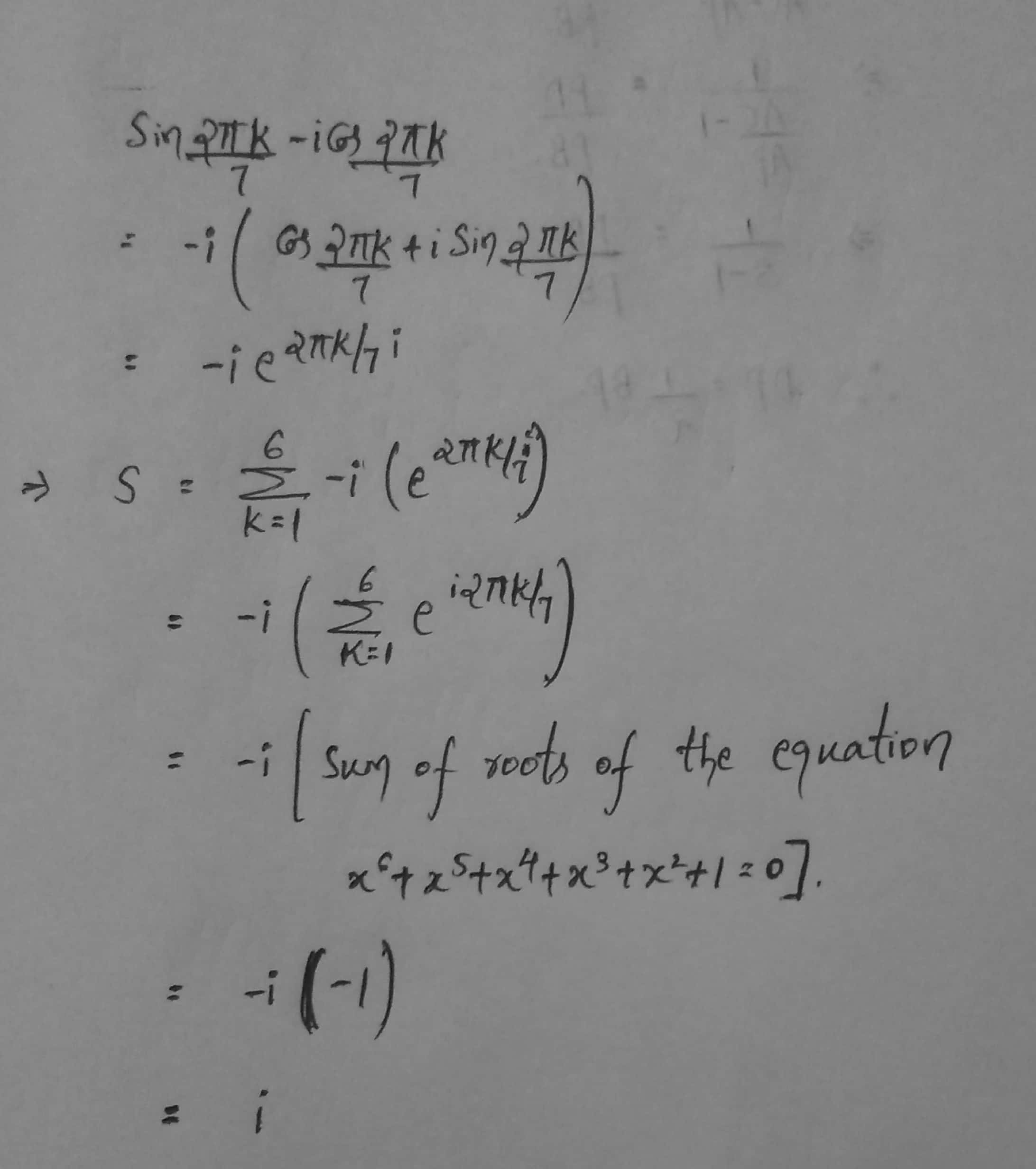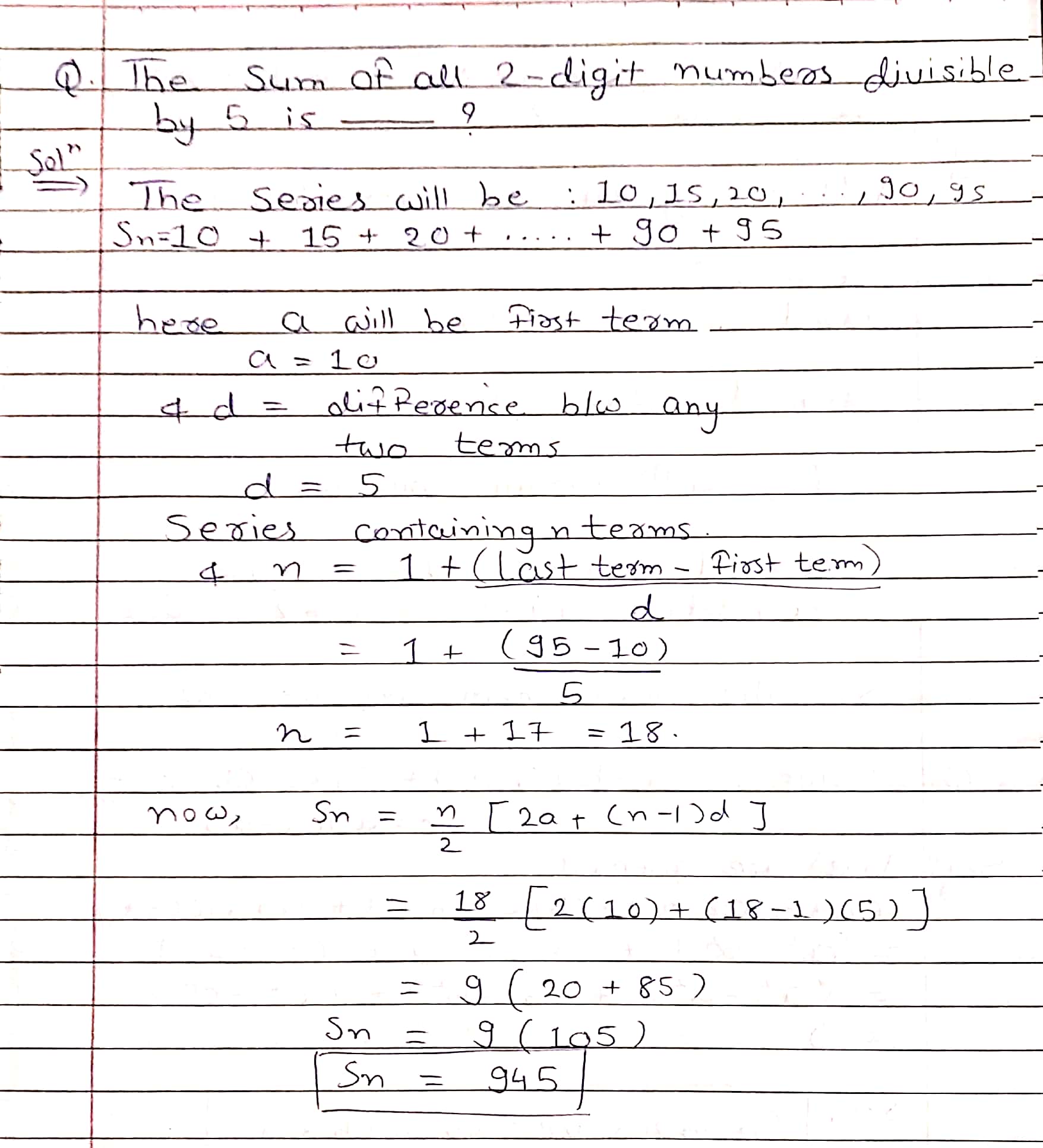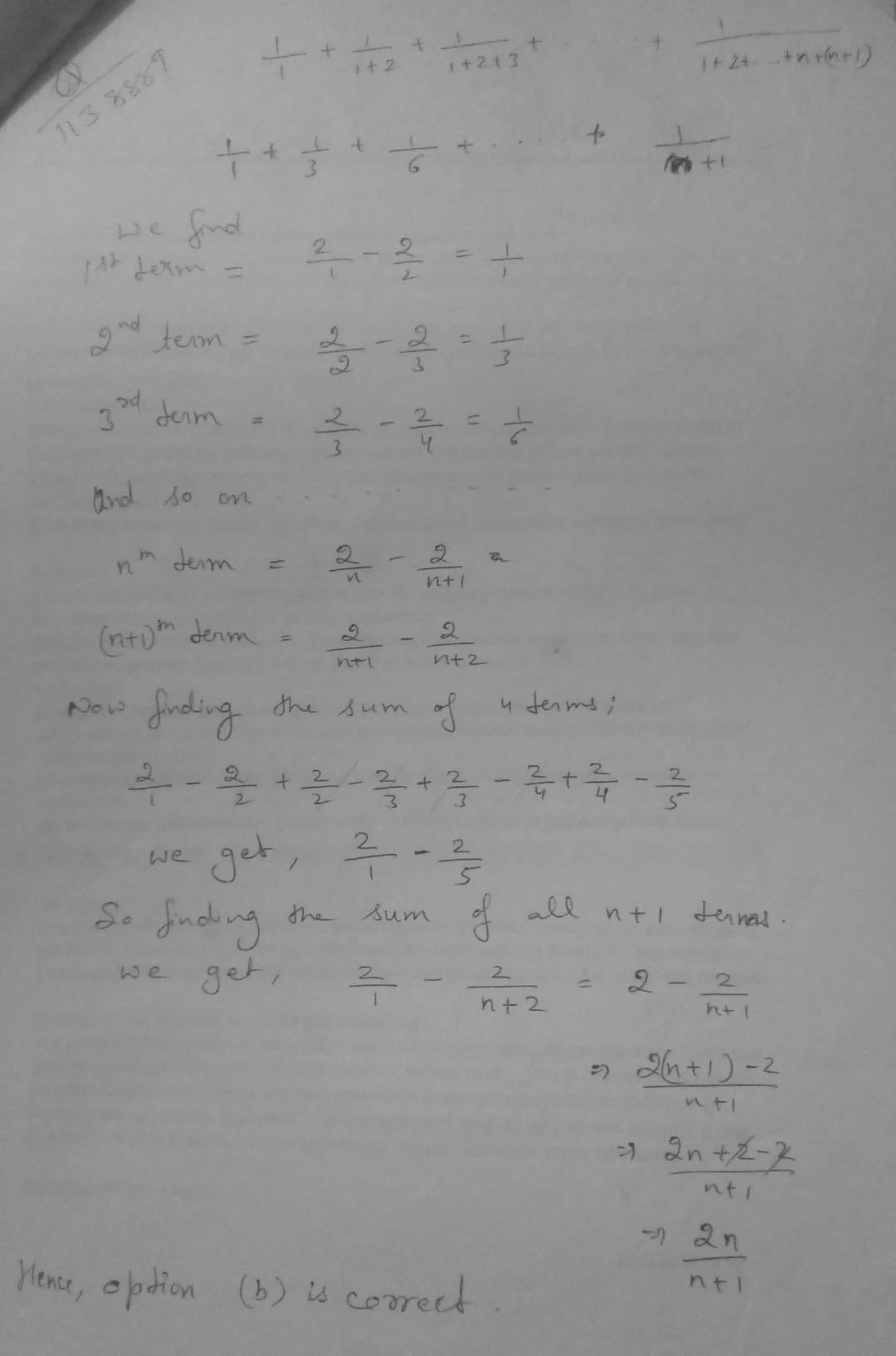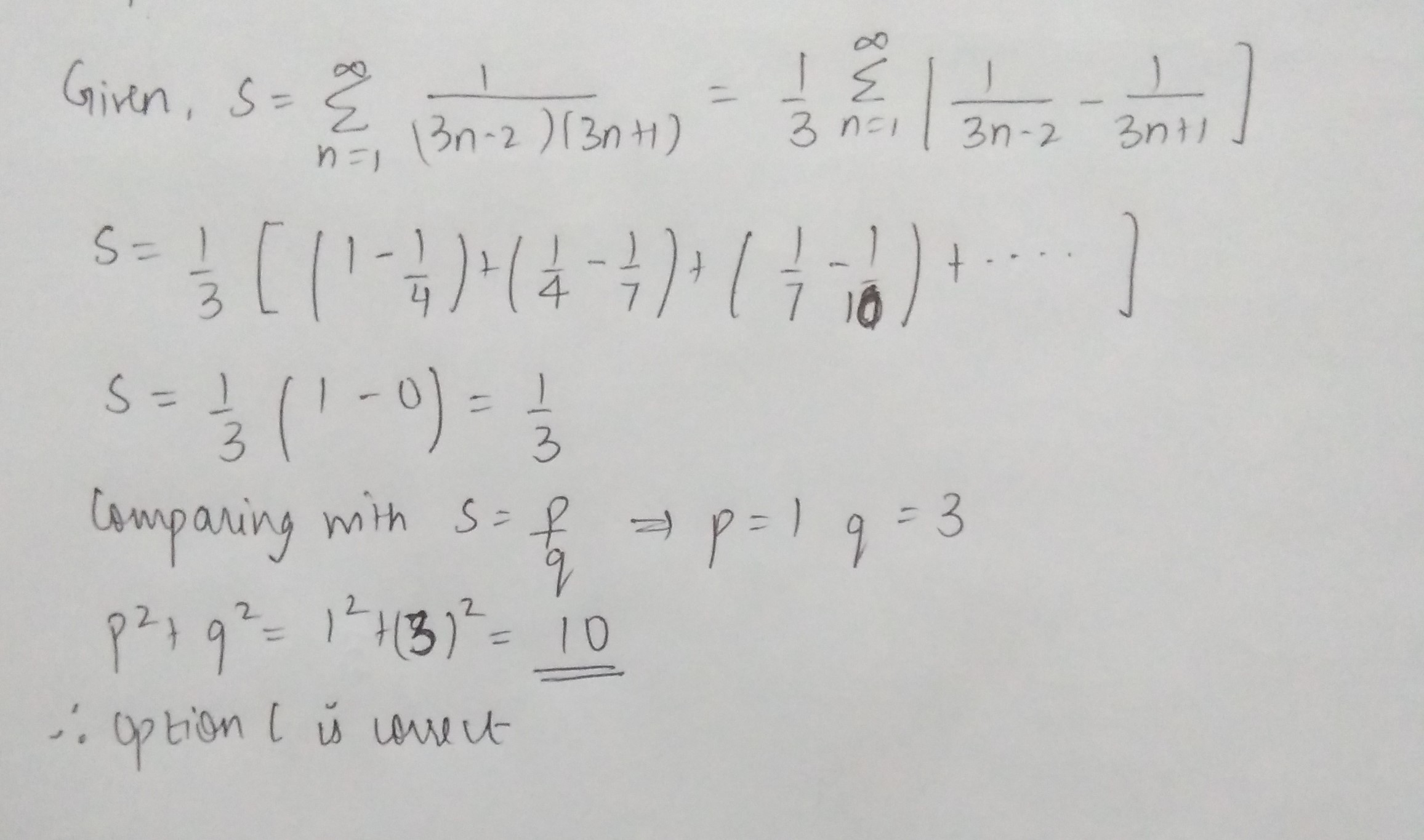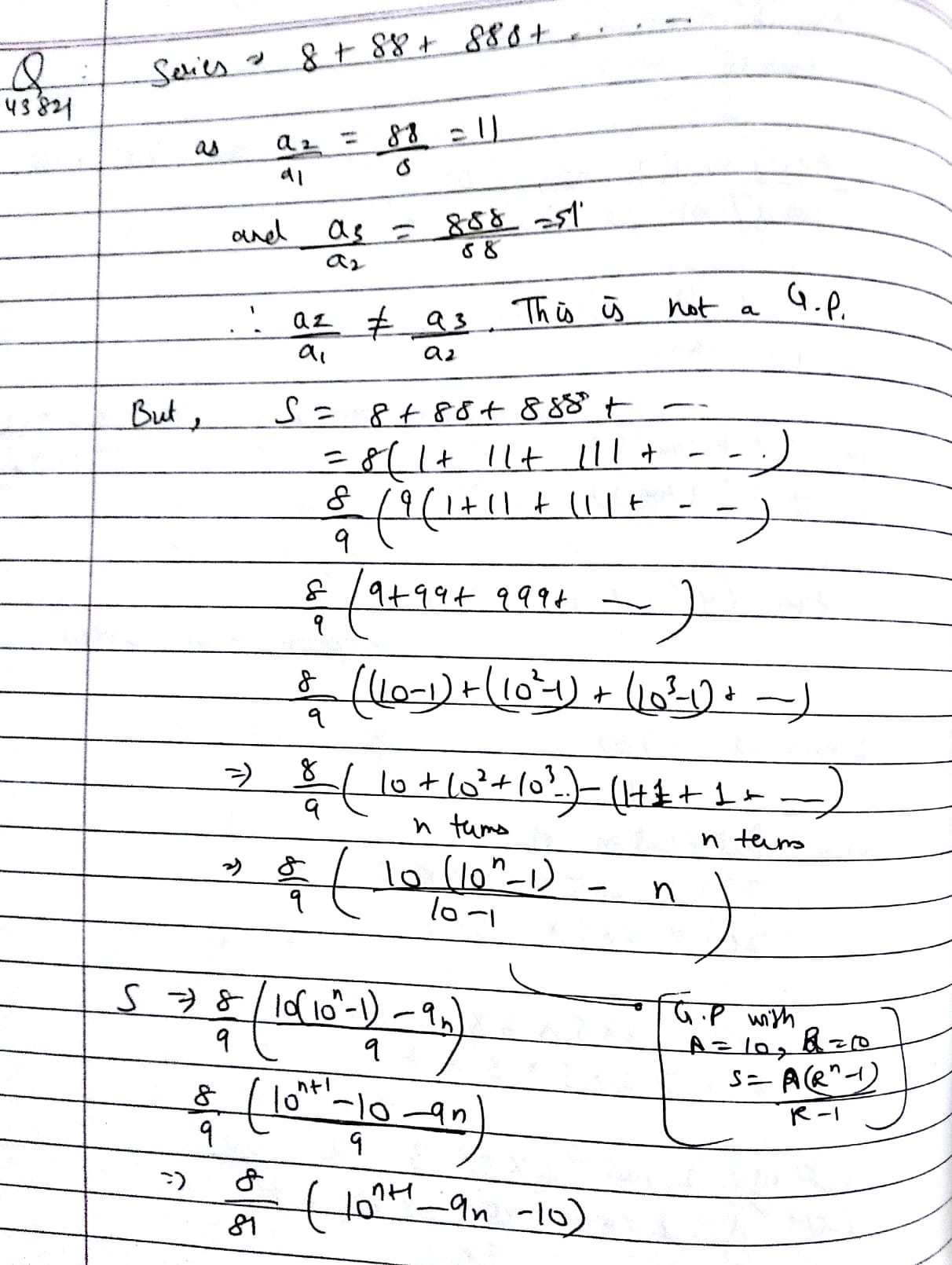Q.1.
The value of $$S=\sum _{ k=1 }^{ 6 }{ \left( \sin { \dfrac { 2\pi k }{ 7 } } -i\cos { \dfrac { 2\pi k }{ 7 } } \right) }$$ ?
-
0%
$$-1$$
-
0%
$$0$$
-
100%
$$-i$$
-
0%
$$i$$
Q.2.
The value of
$$\frac{1}{1!} + \frac{1+2}{2!} + \frac{1+2+3}{3!} + \frac{1+2+3+4}{4!}+
\cods$$ upto infinite terms is equal to
-
0%
(a)$$\frac{3e}{2}$$
-
100%
(b)$$3e -1$$
-
0%
(c)$$2e +1$$
-
0%
(d)$$\frac{5e}{2}$$
Q.3.
Find sum $${1}^{2}+{3}^{2}+{5}^{2}+...+{(2n-1)}^{2}$$
-
0%
$$\dfrac{n(2n+1)(2n+1)}{3}$$.
-
0%
$$\dfrac{n(2n-1)(2n+1)}{3}$$.
-
100%
$$\dfrac{2n(2n-1)(2n+1)}{3}$$.
-
0%
None of these
Q.4.
The sum to the first n terms of the series $$\dfrac{1}{2} + \dfrac{3}{4} + \dfrac{7}{8} + \dfrac{{15}}{{16}} + {\rm{ }} \ldots $$ is $$9 + {2^{ - 10}}$$. The value of n is
-
100%
$$10$$
-
0%
$$9$$
-
0%
$$8$$
-
0%
none of these
Q.5.
If $$\sum\limits_{i = 1}^{20} {{{\sin }^{ - 1}}{\text{ }}{x_i} = 10\pi } then\;\sum\limits_{i = 1}^{20} {{x_i}} \;$$ is equal to
-
0%
20
-
0%
10
-
0%
0
-
100%
1
Q.6.
What is the sum of the series $$\dfrac{1}{{{3^2} - 4}} + \dfrac{1}{{{7^2} - 4}} + \dfrac{1}{{{{11}^2} - 4}} + ..... + \dfrac{1}{{{{39}^2} - 4}}$$
-
0%
$$\dfrac{{10}}{{41}}$$
-
0%
$$\dfrac{{40}}{{41}}$$
-
100%
$$\dfrac{{20}}{{41}}$$
-
0%
$$\dfrac{{30}}{{41}}$$
Q.7.
Number of identical terms in the sequence $$2, 5, 8, 11,$$___ upto $$100$$ terms and $$3, 5, 7, 9, 11$$____ upto $$100$$ terms are
-
0%
$$17$$
-
0%
$$33$$
-
0%
$$50$$
-
100%
$$147$$
Q.8.
The value of the expression $$\left(\dfrac{1}{2^2 -1}\right) + \left(\dfrac{1}{4^2 -1}\right) + \left(\dfrac{1}{6^2 -1}\right) + ... + \left(\dfrac{1}{20^2 -1}\right)$$ is
-
100%
$$\dfrac{9}{19}$$
-
0%
$$\dfrac{10}{19}$$
-
0%
$$\dfrac{10}{21}$$
-
0%
$$\dfrac{11}{21}$$
Q.9.
$$67,84,95,.,133,158$$
-
0%
$$116$$
-
0%
$$129$$
-
0%
$$108$$
-
0%
$$111$$
Q.10.
Let $$S_n=\dfrac{1}{1+2008n}+\dfrac{1}{2+2008n}+...+\dfrac{1}{2009n}$$. Then $$\displaystyle\lim_{n\rightarrow\infty}S_n$$ equals?
-
0%
$$log\left(\dfrac{1}{2008}\right)$$
-
0%
$$log\left(1+\dfrac{1}{2008}\right)$$
-
0%
$$log\left(\dfrac{1}{2009}\right)$$
-
0%
$$log\left(1+\dfrac{1}{2009}\right)$$
Q.11.
Find the value of ?.
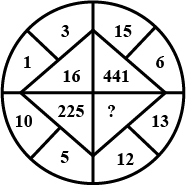

-
0%
$$125$$
-
0%
$$25$$
-
0%
$$625$$
-
0%
$$156$$
Q.12.
If $$\frac{a_2a_3}{a_1a_4}=\frac{a_2+a_3}{a_1+a_4}=3\left(\frac{a_2-a_3}{a_1-a_4}\right)$$ then $$a_1, a_2$$ and $$a_3$$ are in which progression?
-
0%
A.P.
-
0%
G.P.
-
0%
H.P.
-
0%
None of these
Q.13.
$$\sum n =55 \implies n=5$$
-
0%
True
-
0%
False
Q.14.
The sum of all $$2$$-digit numbers divisible by $$5$$ is _________?
-
0%
$$1035$$
-
0%
$$1245$$
-
0%
$$1230$$
-
0%
$$945$$
Q.15.
If $$S_r=\left |
\begin{array}{111}
2r & x & n(n+1)\\
6r^2-1 & y & n^2(2n+3)\\
4r^3-2nr & z & n^3(n+1)\\
\end{array}
\right |
$$ then $$\sum_\limits{r=1}^n S_r$$
does not depends on
\begin{array}{111}
2r & x & n(n+1)\\
6r^2-1 & y & n^2(2n+3)\\
4r^3-2nr & z & n^3(n+1)\\
\end{array}
\right |
$$ then $$\sum_\limits{r=1}^n S_r$$
does not depends on
-
0%
x
-
0%
y
-
0%
n
-
0%
all of these
Q.16.
If $$ (1^2-t_1)+ (2^2-t_2) +.......+(n^2-1)$$, then $$t_n$$ is
-
0%
$$\frac{n}{2}$$
-
0%
$$n -1$$
-
0%
$$n+1$$
-
0%
$$n$$
Q.17.
Insert the missing number in the given series : $$ 0,4,18,48, ?, 180$$
-
0%
$$58$$
-
0%
$$68$$
-
0%
$$84$$
-
0%
$$100$$
Q.18.
Ten students of the physics department decided to go on a educational trip.They hired a mini bus for the trip, but the bus can only carry eight students at a time and each student goes at least once. Find the minimum number of trips the bus has to make so that each students can go for equal number of trips.
-
0%
$$5$$
-
0%
$$4$$
-
0%
$$6$$
-
0%
$$8$$
Q.19.
For a sequence $$\left\{ { a }_{ n } \right\} ,{ a }_{ 1 }=2$$ and $$\dfrac { { a }_{ n+1 } }{ { a }_{ n } } =\dfrac { 1 }{ 3 }$$. Then $$\sum _{ r=1 }^{ 20 }{ { a }_{ r } } $$ is
-
0%
$$\dfrac {20}{2}[4+19\times 3]$$
-
0%
$$3(1-\dfrac {1}{3^{20}})$$
-
0%
$$2(1-3^{20})$$
-
0%
$$(1-\dfrac {1}{3^{20}})$$
Q.20.
Number of rectangles in the grid shown which are not squares is?
-
0%
$$160$$
-
0%
$$162$$
-
0%
$$170$$
-
0%
$$185$$
Q.21.
$$1,2,1,4,3,8,9,5,27,16,?,?,?$$
-
0%
$$7,36,64$$
-
0%
$$7,25,64$$
-
0%
$$9,25,64$$
-
0%
$$7,25,49$$
Q.22.
If $$\underset{r = 1}{\overset{n}{\sum}} r (r + 1) (2r + 3) = an^4 + bn^3 + cn^2 + dn + e$$, then
-
0%
a + c = b + d
-
0%
e = 0
-
0%
$$a, b - \dfrac{2}{3}, \, c - 1$$ are in A. P.
-
0%
$$\dfrac{c}{a}$$ is an integer
Q.23.
$$\displaystyle \sum^{n}_{r=0} (-1)^r \,{^nC_r}. \dfrac{(1 + r \ell n 10)}{(1 + \ell n 10^n)^r} =$$
-
0%
$$0$$
-
0%
$$\dfrac{1}{2}$$
-
0%
$$1$$
-
0%
$$none\ of\ these$$
Q.24.
Evaluate the definite integral:
$$\displaystyle\int_{0}^{\pi/2}\dfrac{\cos^{2}x}{1+3\sin^{2}x}\ dx$$
-
0%
$$\pi /4$$
-
0%
$$\pi /2$$
-
0%
$$\pi /6$$
-
0%
$$\pi /3 $$
Q.25.
$$\cfrac { 7 }{ 5 } \left( 1+\cfrac { 1 }{ { 10 }^{ 2 } } +\cfrac { 1.3 }{ 1.2 } .\cfrac { 1 }{ { 10 }^{ 4 } } +\cfrac { 1.3.5 }{ 1.2.3 } .\cfrac { 1 }{ { 10 }^{ 6 } } +....\infty \right) =\sqrt { 2 } $$
-
0%
True
-
0%
False
Q.26.
The sum $$2 \times 5 + 5 \times 9 + 8 \times 13 + \ldots 10$$ term is
-
0%
$$4500$$
-
0%
$$4555$$
-
0%
$$5454$$
-
0%
None of these
Q.27.
$$1+\cfrac{1}{4}+\cfrac{1.3}{4.8}+\cfrac{1.3.5}{4.8.12}+.....\infty=\sqrt{2}$$
-
0%
True
-
0%
False
Q.28.
A series is given as: $$4+7+10+13+16+.....$$ Find the sum of the series up to $$10$$ terms.
-
0%
$$110$$
-
0%
$$125$$
-
0%
$$162$$
-
0%
$$175$$
Q.29.
The unit's place digit in $$(1446)^{4n + 3}$$ is
-
0%
$$n$$
-
0%
$$0$$
-
0%
$$6$$
-
0%
None of these
Q.30.
The sum of the infinite series, $$ { 1 }^{ 2 }-\dfrac { { 2 }^{ 2 } }{ 5 } +\dfrac { { 3 }^{ 2 } }{ { 5 }^{ 2 } } -\dfrac { { 4 }^{ 2 } }{ { 5 }^{ 3 } } +\dfrac { { 5 }^{ 2 } }{ { 5 }^{ 4 } } -\dfrac { { 6 }^{ 2 } }{ { 5 }^{ 3 } } + .......... $$ is
-
0%
$$\dfrac { 1 }{ 2 }$$
-
0%
$$ \dfrac { 25 }{ 24 }$$
-
0%
$$ \dfrac { 25 }{ 54 }$$
-
0%
$$ \dfrac { 125 }{ 252 }$$
Q.31.
The sum of infinity of the series $$\dfrac{1}{1} + \dfrac{1}{1 + 2} + \dfrac{1}{1+2+3}+$$______ is equal to:
-
0%
$$2$$
-
0%
$$\cfrac{5}{2}$$
-
0%
$$3$$
-
0%
None of these
Q.32.
Solve then inequality
$$\dfrac {x-1}{x}\geq 2$$
-
0%
$$x\leq 1$$
-
0%
$$x\leq -1$$
-
0%
$$x\leq0$$
-
0%
$$x \in R$$
Q.33.
The sum of the series $$1+2.2+3.2^{2}+4.2^{3}+5.2^{4}+.+100.2^{99}$$ is ?
-
0%
$$99.2^{100} -1$$
-
0%
$$100.2^{100} +1$$
-
0%
$$99.2^[100}$$
-
0%
$$99.2^{100}+1$$
Q.34.
If $${ S }_{ n }=\overset { n }{ \underset { r=1 }{ \Sigma } } { t }_{ r }=\dfrac { 1 }{ 6 } n\left( 2{ n }^{ 2 }+9n+13 \right) $$, then $$\overset { n }{ \underset { r=1 }{ \Sigma } } \sqrt { { t }_{ r } } $$ equals ?
-
0%
$$\dfrac { 1 }{ 2 } n\left( n+1 \right) $$
-
0%
$$\dfrac { 1 }{ 2 } n\left( n+2 \right) $$
-
0%
$$\dfrac { 1 }{ 2 } n\left( n+3 \right) $$
-
0%
$$\dfrac { 1 }{ 2 } n\left( n+5 \right) $$
Q.35.
If $$a_n=n(n!)$$, then $$\displaystyle\sum^{100}_{r=1} a_r$$ is equal?
-
0%
$$101!$$
-
0%
$$100!-1$$
-
0%
$$101!-1$$
-
0%
$$101!+1$$
Q.36.
If $$a_{1}=a_{2}=2,a_{n}=a_{n-1}-1(n > 2)$$ then $$a_{5}$$ is ?
-
0%
$$1$$
-
0%
$$-1$$
-
0%
$$0`$$
-
0%
$$-2$$
Q.37.
The sum of the series $$1+\dfrac{1}{4\times 2!}+\dfrac{1}{16\times 4!}+\dfrac{1}{64\times 6!}+....\infty$$ is?
-
0%
$$\dfrac{e+1}{\sqrt{e}}$$
-
0%
$$\dfrac{e-1}{\sqrt{e}}$$
-
0%
$$\dfrac{e+1}{2\sqrt{e}}$$
-
0%
$$\dfrac{e-1}{2\sqrt{e}}$$
Q.38.
If $${x}_{1},{x}_{2},. . . . .,{x}_{n}$$ are any real number and $$n$$ is any positive integer, then ?
-
0%
$$n\sum _{ i=1 }^{ n }{ { x }_{ i }^{ 2 }<{ \left( \sum _{ i=1 }^{ n }{ { x }_{ i } } \right) }^{ 2 } }$$
-
0%
$$n\sum _{ i=1 }^{ n }{ { x }_{ i }^{ 2 }\ge { \left( \sum _{ i=1 }^{ n }{ { x }_{ i } } \right) }^{ 2 } }$$
-
0%
$$n\sum _{ i=1 }^{ n }{ { x }_{ i }^{ 2 }\ge n{ \left( \sum _{ i=1 }^{ n }{ { x }_{ i } } \right) }^{ 2 } }$$
-
0%
$$None\ of\ the\ above $$
Q.39.
Sum of first n terms of the series $$\frac{1}{2} + \frac{3}{4} + \frac{7}{8} + \frac{{15}}{{16}} + ....$$ is equal to
-
0%
$${2^n} - n - 1$$
-
0%
$$1 - {2^{ - n}}$$
-
0%
$$n + {2^{ - 2}} - 1$$
-
0%
none of these
Q.40.
The $$nth$$ term of the series $$4, 14, 30, 52, 80, 114, ...$$ is
-
0%
$$n^{2} + n + 2$$
-
0%
$$3n^{2} + n$$
-
0%
$$3n^{2} - 5n + 2$$
-
0%
$$(n + 1)^{2}$$
Q.41.
The sum of $$(n+1)$$ terms of $$\frac { 1 }{ 1 } +\frac { 1 }{ 1+2 } +\frac { 1 }{ 1+2+3 } +.......is$$
-
0%
$$\frac { n }{ n+1 } $$
-
0%
$$\frac { 2n }{ n+1 } $$
-
0%
$$\frac { 2 }{ n\left( n+1 \right) } $$
-
0%
$$\frac { 2\left( n+1 \right) }{ n+2 } $$
Q.42.
The sum of the series $$\dfrac {5}{1 \cdot 2 \cdot 3}+\dfrac {7}{3 \cdot 4 \cdot 5}+\dfrac {9}{5 \cdot 6 \cdot 7}+....$$ is
-
0%
$$\log \dfrac {8}{e}$$
-
0%
$$\log \dfrac {e}{8}$$
-
0%
$$\log2$$
-
0%
$$\log \dfrac {1}{2}$$
Q.43.
If the sum of the series $$1+\dfrac{3}{x}+\dfrac{9}{x^{2}}+\dfrac{27}{x^{3}}+....$$ to $$\infty$$ is a finite number then
-
0%
$$x>3$$
-
0%
$$x<-3$$
-
0%
$$x<-3\ or\ x>3$$
-
0%
$$None\ of\ these$$
Q.44.
The sum of the series $$1^{3}+3^{3}+5^{3}+....$$ upto $$20$$ terms is
-
0%
$$319600$$
-
0%
$$321760$$
-
0%
$$306000$$
-
0%
$$347500$$
Q.45.
The value of $$\sum_{n=1}^{\infty}\dfrac{1}{(3n-2)(3n+1)}$$ is equal to $$\dfrac{p}{q}$$, where $$p$$ and $$q$$ are relatively prime natural numbers. Then the value of $$(p^2+q^2)$$ is equal to
-
0%
$$4$$
-
0%
$$9$$
-
0%
$$10$$
-
0%
$$13$$
Q.46.
Select the missing number from the given responses ?
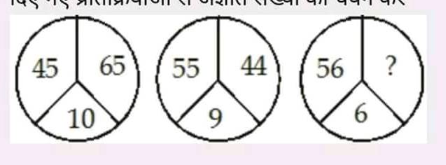

-
0%
$$15$$
-
0%
$$10$$
-
0%
$$12$$
-
0%
$$17$$
Q.47.
If $$abc=1$$, then the value of $$\dfrac{1}{1+a+b^{-1}}+\dfrac{1}{1+b+c^{-1}}+\dfrac{1}{1+c+a^{-1}}$$ is
-
0%
$$abc$$
-
0%
$$a$$
-
0%
$$1$$
-
0%
$$3$$
Q.48.
The sum $$1 + 3 + 7 + 15 + 31 + \ldots $$ to $$n$$ term is
-
0%
$${2^n} - 2 - n$$
-
0%
$${2^{n - 1}} - 1 - n$$
-
0%
$${2^{n + 1}} - 2 - n$$
-
0%
None of these
Q.49.
Find: $$6,25,62,123,(?),341$$
-
0%
$$216$$
-
0%
$$214$$
-
0%
$$215$$
-
0%
$$218$$
Q.50.
Sum of $$n$$ terms of the series $$8+88+888+.$$ equals
-
0%
$$\dfrac {8}{18}[10^{n+1}-9n-10]$$
-
0%
$$\dfrac {8}{18}[10^{n}-9n-10]$$
-
0%
$$\dfrac {8}{18}[10^{n+1}+9n-10]$$
-
0%
$$None\ of\ these$$
